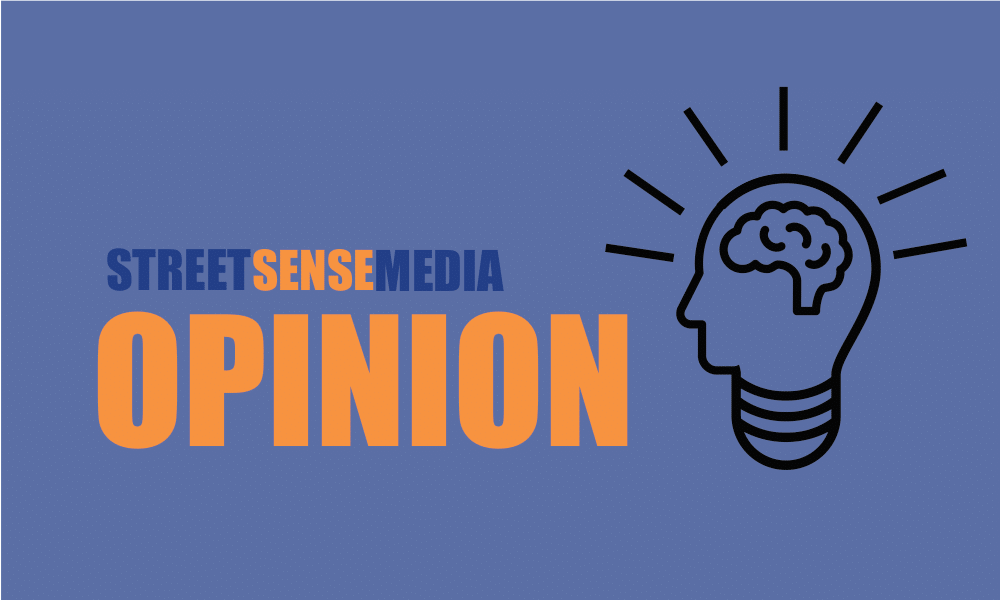The Poor People’s Campaign held a mass meeting on Jan. 29 as part of a 20-plus-state tour to prepare for a huge rally and march on Washington that will happen early in the summer. “We’re coming back June 20th 2020,” said Alvin Jackson, an organizing leader for the D.C. chapter of the campaign.
To get the meeting started, Rev. Glenna Huber welcomed guests to the Church of the Epiphany in downtown D.C. “We understand the Biblical mandate of God’s love,” she said before giving the floor to Rev. Liz Theodoris, a national leader of the campaign.
[Disclosure: Street Sense Media rents office space from the Church of the Epiphany]
This revival of MLK’s 1968 Poor People’s Campaign was launched in 2018 with the theme of highlighting and connecting many intersecting and overlapping issues of poverty. At the Jan. 29 meeting, local activists and impoverished people from across the country had a chance to speak.
[Read more: After 50 years, organizers reignite MLK’s Poor People’s Campaign]
A common theme of modern-day poverty in the United States is the shift in demographics in cities where gentrification is occurring. Cheryl Brunson, a resident and leader of the tenants association at Brookland Manor in Northeast D.C. spoke for many low-income people here in the District.
“Developers are trying to throw us out of our own community,” Brunson said. “They are jailing us in our own neighborhoods. Legislators are allowing this to happen to us … I’ve been here 30-plus years. They’re using [Brookland Manor] as a cash cow. This is our home.”
Brunson said Mayor Muriel Bowser gave a developer $47 million to build on the property and put out the remaining residents by not building units large enough to fit their families. “They’re jailing our teenagers for leaning on the fence, for standing on the porch. It’s breaking my heart,” Brunson said. “The neighbors that I used to see are there no more. They are not neighbors anymore because they are homeless.”
In an effort to stay in their homes, Brunson and the tenant association have been organizing neighborhood events, filing appeals, and testifying before D.C. Council. “We’ll continue to stand strong,” Brunson said. “Hell, no, we won’t go.”
[Read more: Brookland Manor residents keep battling possible displacement]
Megan Macaraeg, labor organizer for the D.C.-based immigrant rights nonprofit, Many Languages One Voice, said people who live in poverty are subject to trauma and violence, and often experience police brutality.
Macaraeg described a call she received from a neighbor about an incident in Columbia Heights where the police had “crushed” a 15-year-old to the ground for the crime of selling tamales on 14th St NW in Columbia Heights. The teenager, Genesis Lemus, joined Macaraeg at the podium.
“Street vending [without a permit] is criminal in D.C.,” Macaraeg said. She praised the youth that Many Languages One Voice has been organizing, saying young people have been actively pressuring the D.C. Department of Consumer and Regulatory Affairs to provide them with permits so that they may earn a living legally.
For Lark Catoe-Emerson, another District resident, poverty has a different manifestation when compounded with mental health issues. Catoe-Emerson said she was never able to have a normal relationship with her adopted mother because her mother did not receive adequate treatment for paranoid schizophrenia.
Catoe-Emerson said the court system is built to destroy Black families, adding that waiting to intervene until a person is an immediate threat to themselves or others is a sign of inadequate health care. She said she was blocked from managing her mother’s care, which left her mother without the option of staying in her home or the ability to keep her things.
“I should have been able to take care of her. But I spend my time fighting the system that profits to keep her the ward of the state,” Catoe-Emerson said. “For too long the lawmakers have ignored the pain and struggle of poor people. The mayor’s ‘Fair Shot’ [language] sounds good, but it’s more harmful than helpful. It blames the poor for their poverty.”
Catoe-Emerson said she is not a bad mother if her kids steal food because they don’t get enough through the school lunch program and that being unable to afford a lawyer does not make her a bad daughter. She said tax dollars should be used for housing and health care, not to fund wars, the lifestyles of politicians, or dog parks. Catoe-Emerson urged attendees to organize and take action.
“They may be able to ignore me if I stand alone,” she said, “but not if we stand together. They can’t ignore 140 million poor people in this country if we stand together.”
Karla Mendez-Guerrero, a deaf student at Gallaudet University and the director of equity for the student body government, said the deaf community experiences high rates of unemployment, leaving many deaf people with no option but to rely on Social Security Disability Insurance as income. But it is not enough. “Who can afford to live on just $771 a month?” asked Mendez-Guerrero, who is the first in her family to attend college. “I’ve been struggling financially. My father’s income increased recently. But that resulted in them cutting my financial aid.”
She said her father’s increase in income isn’t enough to support her schooling, and she’s not alone. More than 120 students, or 10 percent of the student body, had to leave the university due to financial issues, according to Mendez-Guerrero. She said finishing college is critically important because many employers discriminate against deaf people and there are not enough good-paying jobs.
”Our president has proposed cuts in SSI and SSD, and that means some of us won’t be able to afford health care.” Mendez-Guerrero said. “I believe we need equality and that we all need the opportunity to live.”
Representatives of poor people from across the country told the group why they’ll be joining the June, 2020, march on Washington.
West White, an organizer with the California Homeless Union, described homelessness as the most visible expression of poverty. “In the wealthiest state, human beings are living in chicken coops on gas station rooftops, on river bottoms. Our children are being stolen from us simply because we cannot afford housing. Entire families spend the night in cars running the engines all night and dying of carbon monoxide poisoning as a result. Where I live In Monterey County, 6,000 students don’t have a house to live in.”
White said his union is bringing together those who have nothing left to lose.
Wendsler Nosie, Sr., former Chairman and Councilman of the San Carlos Apache Tribe in southeast Arizona, said the U.S. government is preparing to transfer ownership of a mountain that his people view as holy to a foreign company. The company will mine the mountain for copper and other minerals. “For over 500 years, Native Americans have suffered,” Nosie said. “Without mother earth we have nothing.”
Hope Koss, a woman from Pennsylvania, said she was born poor and saw enlistment in the U.S. Military as the only pathway out of poverty. “The poverty draft is very real,” Koss said. In the military, she faced discrimination for being a woman and was decommissioned early. With no home to return to, she eventually became homeless. Now she works for Put People First PA, advocating for health care as a human right.
Koss claimed that University of Pittsburgh Medical Center, a $20 billion nonprofit, controls many hospitals throughout the state and has purchased many failing rural hospitals, ostensibly to save them. She said UPMC has instead repeatedly allowed such facilities to fail in order to rezone and resell the property. Koss said residents who relied on those hospitals are dying because they cannot afford to travel to the next town to get the health care they need.

Rev. William Barber, one of the co-chairs of the Poor People’s Campaign, said the first role of the campaign is to force a focus on poverty that hasn’t existed for 50 years. He called the idea of scarcity in America a cover-up, and accused lawmakers in 22 states that have passed voter suppression laws since 2010 of diluting power, maintaining the status quo, and holding down the poor. He railed against the fact that it takes 107 hours of minimum-wage work per week to afford a basic apartment in D.C. and that more than 6,500 people are homeless. “That’s the cover-up, it doesn’t have to be that way,” Barber said. “We have the money, we just don’t have the mercy. We have the cash but we just don’t have the conscience.”
Pastor Graylan Hagler of Plymouth Congregational Baptist Church on North Capitol Street NE further expounded on the situation in the District of Columbia. He said Black and brown people are being rapidly displaced from the city. “We’re trying to bring a halfway house to D.C.,” Hagler said. “The politicians don’t want them to come home. We’re not going anywhere.”
[Read more: What’s next for Hope Village and its residents? The only halfway house for men in DC will close its doors on Oct. 31]
Barber said one-third of the country is stricken by poverty, and 250,000 Americans die in poverty each year — roughly 700 people per day. “But seven people died from vaping and we got a hearing and a presidential meeting and called it a national emergency,” Barber said.
He said there ought to be a “mourning” in America. He reminded the crowd that when the speakers that preceded him were sharing their stories, they were sharing tragedies. “Don’t clap like it’s something to be celebrated,” Barber said. “When we hear what people are going through, our hearts should mourn, our eyes should tear up, our feet should prepare to march, our mouths should swing open, to even think we have to have a homeless union in America.”
Barber said the march on Washington in June will create a stage for poor people to testify and demand that these moral failings be addressed.
A “mobilization meeting” for the D.C. chapter of the campaign is scheduled for 10 a.m. on Saturday, Feb. 22, at John Wesley AME Zion Church, 1615 14th St NW.
“We are going to change the narrative. America, your heart will be broken, your conscience will be sheared, and we will show you a way out, if you let us,” Barber said.








